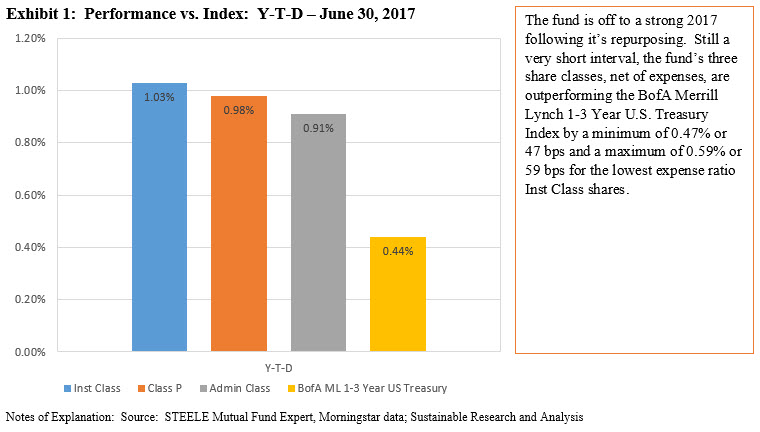
Synopsis
Like its counterpart the PIMCO Total Return ESG Fund, the PIMCO Low Duration Fund, which is a short-term corporate bond fund, changed its name to PIMCO Low Duration ESG Fund effective January 6, 2017. At the same time, the fund modified its investment strategy to take into account the efficacy of an issuer’s environmental, social and governance (ESG) practices, to exclude securities issued by certain issuers (exclusionary strategies) from the portfolio and to engage proactively with issuers to encourage them to improve their ESG practices. The fund’s one, three, five and 10 year performance track record net of fees has been consistently above benchmark across its three institutionally oriented share classes. But its ESG strategy is newly adopted and without the benefit of a track record. The outcome will take some time to become evident so it’s not as yet possible to evaluate the firm’s strategy implementation. That said, factors that contribute to the High Conviction assessment are PIMCO’s formidable fixed income franchise, the explicit nature of the newly adopted ESG strategy and the fact that the firm is dedicating resources to the ESG initiative. This, in combination with an already established fund that at the end of June held $164.9 million in net assets gives the team a strong foundation to implement the strategy. So far, the fund’s year-to-date performance exceeds that of its BofA Merrill Lynch 1-3 Year U.S. Treasury Index. But as in the past, the fund’s future results have to overcome higher than median expense ratios, the lowest of which is 0.52% applicable to the Inst Class shares and rising to 0.77% applicable to the Admin Class. The fund is not directly open to retail investors give that the three share classes are each subject to $1.0 million initial investments.
Analysis
The fund, which is managed by Pacific Investment Management Company LLC (PIMCO), a member of the Allianz Group and one of the top 10 asset managers in the world with about $1.6 trillion in assets under management, seeks to achieve a maximum total return while preserving capital. To do so, the fund invests at least 65% of its total assets in a diversified portfolio of fixed income instruments of varying maturities, including U.S. and non-U.S. securities and derivative instruments. The fund invests primarily in investment grade instruments, but it may invest up to 10% of its total assets in high yield (non-investment grade) securities. Also, the fund may invest up to 30% of its total assets in securities denominated in foreign currencies, with limitations on its foreign currency exposures and exposures to securities and instruments that are economically tied to emerging market countries, and may invest beyond this limit in U.S. dollar-denominated securities of foreign issuers. While providing significant flexibility this strategy has not produced above average volatility in returns, however, turnover has been considerably higher than average at 257% as of the last fiscal year. The average portfolio duration of the fund, which recently stood at 1.57 years, normally varies from one-to-three years based on the investment manager’s interest rate forecasts.
The fund has adopted a set of exclusionary practices, an ESG integration strategy and issuer engagement approach to improve ESG practices that are clearly set out in the fund’s prospectus. These are described more fully, as follows:
Exclusionary practices
The fund will not invest in the securities of any issuer determined to be engaged principally in the manufacture of alcoholic beverages, tobacco products or military equipment, the operation of gambling casinos, the production of coal, or in the production or trade of pornographic materials. In addition, the fund will not invest in the securities of any issuer determined to be engaged principally in the provision of healthcare services or the manufacture of pharmaceuticals, unless the issuer derives 100% of its gross revenues from products or services designed to protect and improve the quality of human life, as determined on the basis of available information. To the extent possible on the basis of available information, an issuer will be deemed to be principally engaged in an activity if it derives more than 10% of its gross revenues from such activities. In addition, the fund will not invest directly in securities of issuers that are engaged in certain business activities in or with the Republic of the Sudan.
ESG Integration
The fund may avoid investment in the securities of issuers whose business practices with respect to the environment, social responsibility, and governance (ESG) are not to PIMCO’s satisfaction. In determining the efficacy of an issuer’s ESG practices, PIMCO will use its own proprietary assessments of material ESG issues and may also reference standards as set forth by recognized global organizations such as entities sponsored by the United Nations.
Shareholder/Bond holder engagement
PIMCO may engage proactively with issuers to encourage them to improve their ESG practices. PIMCO’s activities in this respect may include, but are not limited to, direct dialogue with company management, such as through in-person meetings, phone calls, electronic communications, and letters. Through these engagement activities, PIMCO seeks to identify opportunities for a company to improve its ESG practices, and will endeavor to work collaboratively with company management to establish concrete objectives and to develop a plan for meeting these objectives. The fund may invest in securities of issuers whose ESG practices are currently suboptimal, with the expectation that these practices may improve over time either as a result of PIMCO’s engagement efforts or through the company’s own initiatives. It may also exclude those issuers that are not receptive to PIMCO’s engagement efforts, as determined in PIMCO’s sole discretion.
Performance Track Record
While the PIMCO Low Duration Fund has been operating since its launch as of December 31, 1996, the new ESG mandate only recently became effective. Under its prior mandate, the fund has delivered strong net returns relative to the BofA Merrill Lynch 1-3 Year U.S. Treasury Index by consistently exceeding the benchmark across each of the three share classes over the previous 1, 3, 5 and 10 year time periods by margins ranging from a low of 0.06% to a high of 1.78%. So far this year, the fund is off to a good start and it is outperforming the BofA Merrill Lynch 1-3 Year U.S. Treasury Index on a year-to-date basis to June 30, 2017. See Exhibit 1.

Expense Ratios
The fund’s expense ratios are above the median for an institutionally oriented fund. Of its three share classes, the lowest, applicable to Inst Class, is subject to a 0.52% expense ratio. This places the charge above the median at 0.47% for a universe of institutionally oriented corporate fixed income funds and slightly below the threshold of 0.55% for the third quartile. The expense ratios charged Class P shareholders and Admin Class shares, at 0.62% and 0.77% rank even worse and fall into the fourth quartile[1]. For a description of the methodology used to stratify expense ratios, refer to Stratifying Expense Ratios: An Explanation.
Bottom Line
With its minimum investment of $1 million, the fund is not available to retail investors on a direct basis. Further, while PIMCO Low Duration Fund has been operating since December 31, 1996, the fund’s modified investment strategy that takes into account the efficacy of an issuer’s environmental, social and governance (ESG) practices, to exclude securities issued by certain issuers (exclusionary strategies) from the portfolio and to engage proactively with issuers to encourage them to improve their ESG practices, has only been in effect since January 6, 2017. The fund’s one, three, five and 10 year performance track record net of fees has been consistently above benchmark across its three institutionally oriented share classes. But its ESG strategy is newly adopted and without the benefit of a track record. The outcome will take some time to become evident so it’s not as yet possible to evaluate the firm’s strategy implementation. That said, factors that contribute to the High Conviction assessment are PIMCO’s formidable fixed income franchise, the explicit nature of the newly adopted ESG strategy and the fact that the firm is dedicating resources to the ESG initiative. This, in combination with an already established fund that at the end of June held $164.9 million in net assets gives the team a strong foundation to implement the strategy. So far, the fund’s year-to-date performance exceeds that of its BofA Merrill Lynch 1-3 Year U.S. Treasury Index. But as in the past, the fund’s future results have to overcome higher than median expense ratios, the lowest of which is 0.52% applicable to the Inst Class shares and rising to 0.77% applicable to the Admin Class. The fund is not directly open to retail investors give that the three share classes are each subject to $1.0 million initial investments
[1] Based on an analysis of expense ratios applicable to 123 institutional funds as of June 30, 2017. Refer to article entitled Stratifying Expense Ratios: An Explanation.






